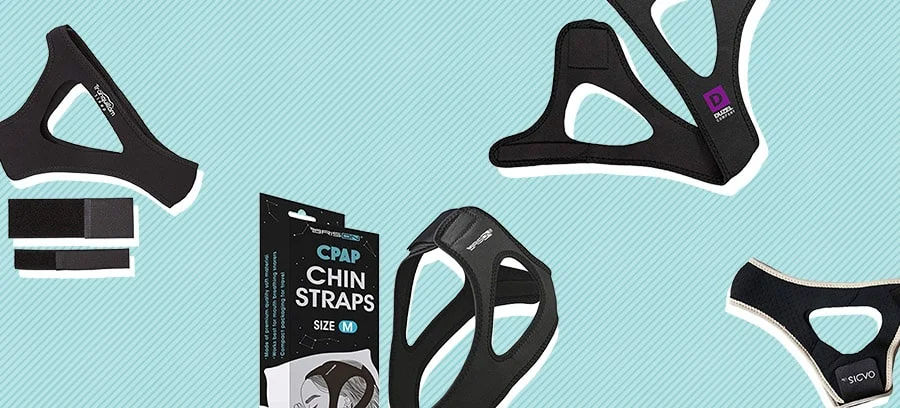
Editor’s Choice – BRISON Anti Snoring Chin Strap
Pros:
- The chin strap is adjustable, so you can customize the fit to your head.
- The material is fairly lightweight, breathable, and durable.
- The elastic material has some stretch to it, which helps with comfort.
- The Velcro closure is on top of your head, so it shouldn’t create pressure points on your face or the back of your head.
Cons:
The fit seems to run small, so keep this in mind while ordering.BRISON Anti Snoring Chin Strip
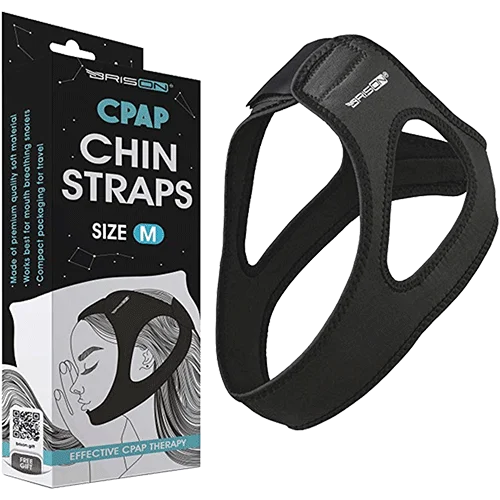
The adjustable BRISON Anti Snoring Chin Strap is lightweight and breathable. The elastic material and top closure increase your chances of sleeping comfortably.
Contender – DUZEL Anti Snoring Chin Strap
Pros:
- The Velcro strap is adjustable, so you can customize the fit.
- The strap is designed with ergonomics in mind. It’s meant to avoid pressure on the chin, cheeks, and head.
- The chin strap has reinforced seams to promote durability.
Cons:
The product might arrive with an unpleasant odor, so you might need to wash it before using.DUZEL Anti Snoring Chin Strap
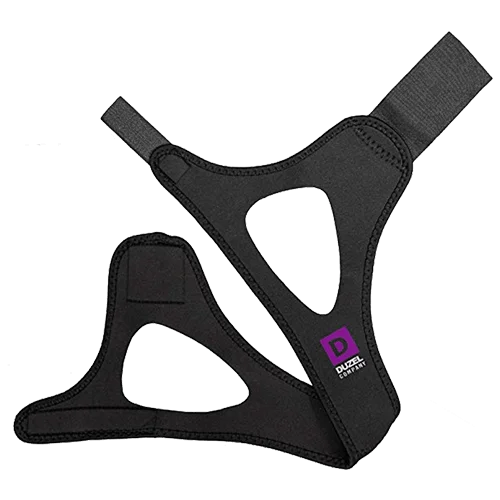
The ergonomic DUZEL Anti Snoring Chin Strap has an adjustable Velcro closure that lets you customize the fit. It’s made with reinforced seams to enhance its durability.
Also Consider – Tranquillam Sleep Chin Strap Anti-Snore Aid
Pros:
- The strap is adjustable, so you can customize the fit to your head.
- It’s reinforced with double stitching, which makes this a durable option.
- The product is designed and tested in the U.S.
Cons:
- One of the two Velcro closures is on the back of the head, which could create discomfort for back sleepers.
- The closure on the back of the head could catch long hair.
Tranquillam Sleep Chin Strap Anti-Snore Aid
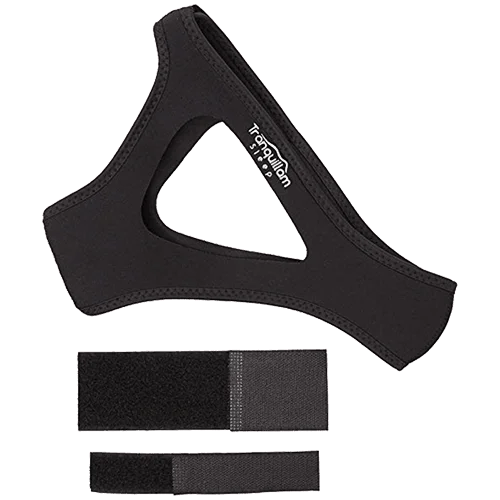
The adjustable Tranquillam Sleep Chin Strap Anti-Snore Aid is designed and tested in the U.S. The strap is reinforced with double stitching to enhance durability.
Honorable Mention – Oacis Life Anti-Snoring Chin Strap
Pros:
- The adjustable strap should fit different head sizes, from small to large.
- The section around the chin is designed to absorb sweat during the night.
- It’s machine-washable, so it’s easy to maintain hygiene.
Cons:
- One of the Velcro closures is on the back of the head, which could be uncomfortable for back sleepers.
- The closure on the back of the head also has a tendency to catch long hair.
Oacis Life Anti-Snoring Chin Strap
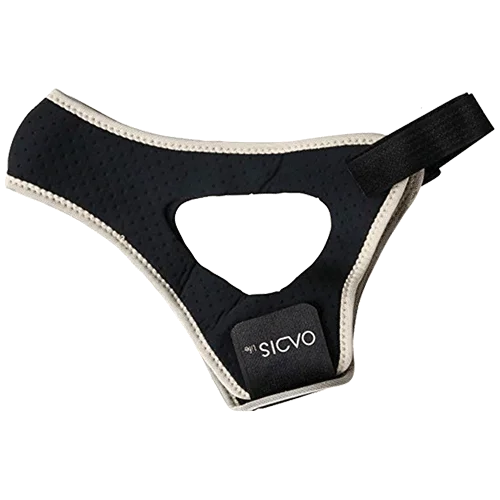
The machine-washable Oacis Life Anti-Snoring Chin Strap is made with a sweat-absorbing material. The adjustable strap should fit a variety of head sizes.
How We Picked
To select our picks for the best anti-snoring chin strap, we emphasized the following factors:Adjustability
Every person’s head shape and size is different, so we focused on anti-snoring chin straps that let you customize the fit to your own head. Each of these options has at least one Velcro closure that gives you some control over the fit and tightness of the strap.Comfort
Any device that’s meant to be worn overnight needs to be comfortable enough that it doesn’t interfere with sleep. For that reason, we prioritized options that are designed with comfort in mind — whether via an ergonomic design, stretchy or breathable materials, and so on. The adjustable nature of each of these straps also increases the likelihood that you’ll be able to achieve a comfortable fit.Durability
If you intend to use a chin strap every night (or close to it), then it should be sturdy enough to withstand frequent use. We emphasized chin straps that are designed to be durable — for example, several of these options have double stitching to increase their chances of withstanding long-term use.Sleepopolis Buying Tips
Trying to select the best anti-snoring chin strap for your needs? Think about the following while researching your options:- Fit. Some chin straps come in different sizes, while others are one-size-fits all. Pay attention to sizing when researching your options so you aren’t surprised by a strap that doesn’t fit properly.
- Materials. If you have strong preferences about the materials that come in contact with your skin, this will help you rule out options.
- Closures. If you’re a back sleeper, you might want to avoid chin straps that have a closure on the back of the head.
FAQs
What is a chin strap used for?
A chin strap is used to keep a person’s mouth closed while they sleep. This requires the sleeper to breathe through their nose, which can potentially reduce snoring. Chin straps typically feature a simple construction that goes around the chin and the top and back of the head.
Do chin straps work for snoring?
Chin straps aren’t guaranteed to prevent snoring, but they do help some people. For instance, people whose snoring typically occurs when they breathe through their mouth might be less likely to snore while wearing a chin strap, because the strap keeps their mouth closed.
Do chin straps really work for sleep apnea?
Research suggests that on their own, chin straps are not a treatment for obstructive sleep apnea. While a chin strap could help reduce the snoring that is common among people with sleep apnea, it’s not effective for addressing the breathing starts and stops that characterize this condition.

























